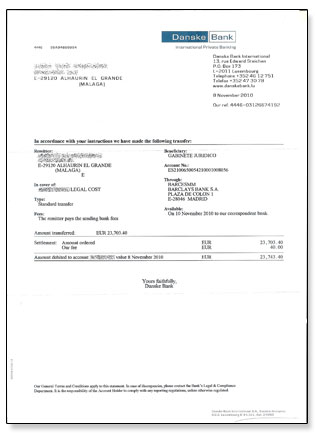Defaulting Spanish Developers to Prove Destination of Deposits, Or Else!
 Reading the Times yesterday, I spotted a funny short article written by David Robertson and Deborah Haynes about the British Army’s SA-80 assault rifle. According to the paper, it has been upgraded several times but its long history of problems has led the military to christen it “the civil servant”, because it does not work and cannot be fired.
Reading the Times yesterday, I spotted a funny short article written by David Robertson and Deborah Haynes about the British Army’s SA-80 assault rifle. According to the paper, it has been upgraded several times but its long history of problems has led the military to christen it “the civil servant”, because it does not work and cannot be fired.
This quote came to mind when being asked for a second opinion in respect of the case of Urbanizadora Costa Palatinum/Proyectos Antele, another failed project by a developer which I can group with many others that dot the costas and which I dub the “civil swindlers”, because they get paid from you to do something, they do nothing, and there is little prospect of realistically getting any funds back, since they have no equity on their assets and no interest whatsoever in refunding, even though the funds should be in some bank account (with Proyectos Antele, in Venezuela it would appear).
As 30 or so purchasers are being dragged around civil courts pointlessly (for this developer now says he has none of the monies), and considering that nothing has been built on a plot they already owned prior to exchanging contracts, as part of my legal inquest into the death of the development, I would like to ask the developers one straight question: where is the dosh matey?
To not make this post too long, I will quote some examples why Spanish top judges are in disagreement of the activities carried out by developers who do just that (i.e. take money, not build, spend money elsewhere and blame the market) and who are upgraded, from the term “civil swindlers”, to a more adequate “criminal misapropriators”.
Two and a Halve Years Sentence for a Developer in Tarragona
Tarragona Provincial Court ruling of the 5-5-2010 – Perpetration of criminal action consisting on: Using the funds and not developing the project. In this case, the developer took €24,000 from a buyer for the purpose of building a property and signed an off-plan private purchase contract. In this instance, the accused, with debts elsewhere, used the funds to settle these and did not build the unit. It is highlighted by the courts that the developer was almost fully aware that he could have not received the license since he did not submitted certain documents, which he completely ignored. This developer had boasted being a reputable developer in the area, and, on this premise, the buyer entrusted him with carrying out the agreed job. I cannot but add here that in the Ocean View Property scandal, Ricardo Miranda had boasted to the press, to gullible Monaco Prince Albert and to ever-smiling President of Dominican Republic, Lionel Fernandez, that 6,000 built units by his “group of companies” preceded him. So either his group of companies encompass Ocean View Properties (who never built but simply acted as unscrupulous agents for several developments -by loading up prices dramatically) or we are going to have to get archaeological experts to dig out those units, most probably built in Phoenician times.
The Tarragona Provincial Audience highlights that the developer had also created an artifice to lure the buyer into buying, and had offered a bank guarantee to cover the down payment (which was never seen).
Three Years and Two Months Sentence for a Developer in Albacete
Albacete Provincial Court ruling of the 1-7-2009 – The Court does a simple mathematical calculation: if when the construction was stopped the developer had only built 43% of his budget (€1,680,000, with a further €2,259,000 to complete the job), had received €3,200,000 from the bank, €980,000 from buyers, having himself put down €2,200,000 (part of which he got back), and after having paid the agents (€240,000) and architects (€80,000), they conclude that there are €580,000 missing…
6 Years and 6 Months Imprisonment for Developer
Supreme Court ruling of the 23-12-2006: Perpetration of criminal action consisting on: Using the funds improperly and not for the destination agreed upon on a property development contract.
8 Years Imprisonment for Misappropriation, Swindle and Embezzlement of Funds
Supreme Court ruling of the 22-10-2008: In this case the developer was in the process of obtaining ownership of a plot of land by means of a swap contract, and whilst this was being processed, he started an aggressive campaign of promotion, as a result of which numerous people that wanted to acquire a property contacted the developer, agreed on the terms of a private purchase contract and paid an upfront sum. It is highlighted that these sums were not paid into a special account opened with the bank nor was an insurance policy issued to protect these down payments (in this instance, the developer argued that he could not get a mortgage for the plot in favour of the guarantor, and therefore the statutory obligation to insure third parties’ funds was not fulfilled).
The court found, when sentencing, that the developer did not pay the funds into the special account he was obliged to, in lieu of the 57/1968 Act, and used these funds to pay architects fees, construction costs, license fees, but also salaries and commissions, publicity and promotional issues which were NOT directly related to the construction and which should have been paid by his own pocket. As the developer could not finalize the construction he is deemed to have misappropriated the funds.
In this ruling, the sentencing court establishes that of the funds received (approximately €2 million), 36% have been used for the purpose of buying the plot and the construction whilst 46% have been used for, fundamentally, promotional costs.
One Year Imprisonment for Misappropriation Reduced After Refund
Supreme Court ruling of the 27-11-1998: This is probable one of the most relevant ruling in that, not offering the buyers bank guarantees nor insurance policies is deemed as a pivotal evidentiary element within the misappropriation, since the developer had received not only funds from buyers but also funds from the bank, all of which exceeded notoriously the cost of the construction, and therefore misappropriation is likely to have occurred.
In this instance the Supreme Court rules that it is notorious that the developers loan drawdowns were guaranteed by a mortgage, and therefore the pecuniary damage to the individual buyers is complete since not only they receive a property, nor can they seize the assets (since it is already mortgaged), nor is there an obligatory bank guarantee offered to protect the buyers, as the law prescribes.
The court determines that where a developer decides to start a project and received funds upfront, it is not mandatory for these to be blocked in a special account. However, it is essential that these funds are used, exclusively, for the use they were intended to, with the required proof of such use, all the while being protected by a bank guarantee. If this does not happen, the court determines that IF a definitive refusal to refund down payments where the property is not finished occurs, in detriment of the buyers, and NO bank guarantees are available to protect these, such omission to protect the buyers allows the court to conclude that the funds were used with a clear intention of not refunding these, in in a definite manner, and therefore intent to defraud encompasses not providing the said guarantees.
The court concludes that the title by which the funds were received includes an obligation to refund, by normative imposition, in the event that the works do not reach a satisfactory conclusion, and therefore deems illicit the use of the funds without ensuring that these are insured or guaranteed.




